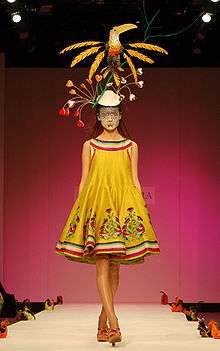British Fashion Council
The British Fashion Council (BFC) is a not-for-profit organisation that harnesses the collective power of the industry to enable sustainable growth and strengthen British fashion in the global fashion economy. Founded in 1983, the BFC organises biannual womenswear and menswear showcases, London Fashion Week (LFW) and London Fashion Week Men's (LFWM) promotes the best of British design to an international audience.
 London Fashion Week is organised by British Fashion Council | |
| Formation | 6 January 1983 |
|---|---|
| Purpose | Promote British fashion in the UK and internationally |
| Headquarters | Somerset House, Strand London, WC2 |
| Leader | Stephanie Phair |
| Website | British Fashion Council |


Leadership and activities
Based in London, the British Fashion Council (BFC) is currently chaired by Stephanie Phair and since 2009, Caroline Rush CBE and Simon Ward have been the organisation's joint Chief Executives.[1][2] Previous Chairs of the BFC have included Natalie Massenet, Edward Rayne, Nicholas Coleridge CBE, Harold Tillman and Sir Stuart Rose.
The BFC organises the twice-yearly London Fashion Week (LFW) and London Fashion Week Men's (LFWM), showcasing the best of British fashion design to an international audience of press and buyers. Alongside this, each season LONDON show ROOMS takes emerging designers to Paris providing the opportunity to promote overseas. The BFC also organises the annual Fashion Awards, designed to celebrate creativity and innovation within the industry, as well as London Fashion Week Festival (LFWF), an all-inclusive event open to the public.
Another facet of the organisation's activities is to support the next generation of designers by supervising fashion higher education and apprenticeships in the United Kingdom.
In May 2018, BFC appointed former England's football team captain, David Beckham, as its new Ambassadorial President.
In 2020, the British Fashion Council paired with designers like Halpern, Julien Macdonald, Liam Hodges, Mulberry, RAEBURN and RIXO, launched a selection of sustainable designer face masks. With all revenue generated going to charity.[3][4][5]
Development of the organisation

The British Fashion Council (BFC) was established in 1983 as a not-for-profit limited company.[6] Prior to the establishment of a single body to promote the interests of the British fashion industry, there were a number of organisations that existed to promote different interests within British fashion. These included:
Events
- London Fashion Week (LFW)
- London Fashion Week Men's (LFWM)
- The Fashion Awards
- LONDON show ROOMS
- London Fashion Week Festival
BFC Support Initiatives
BFC Charities
- BFC Education Foundation
- BFC Fashion Trust
- The Fashion Arts Foundation
- The Fashion Arts Commissions
- The Fashion Arts Film Commissions
- The Global Fund
- Britain Creates
See also
References
- FashionUnited (2009-03-13). "New structure of BFC". fashionunited.uk. Retrieved 2020-07-28.
- "British Fashion Council restructure may give new life to London fashion week". the Guardian. 2009-03-12. Retrieved 2020-07-28.
- "British Fashion Council launches sustainable designer face masks". Evening Standard. 2020-06-05. Retrieved 2020-08-06.
- "British Fashion Council launches reusable 'Great British Designer' face coverings". Circular Online. 2020-06-09. Retrieved 2020-08-06.
- Wightman-Stone, Danielle (2020-06-08). "British designers launch face masks for charity". fashionunited.uk. Retrieved 2020-08-06.
- Sterlacci Purvin, Francesca; Arbuckle, Joanne (2008). Historical Historical Dictionary of the Fashion Industry. Plymouth: Scarecrow Press. pp. 26, 75. ISBN 9780810854543. Retrieved 16 September 2014.
- Waddell, Gavin (2004). How Fashion Works: Couture, Ready-to-Wear and Mass Production. Oxford: Blackwell Science. pp. 175–7. ISBN 9780632057528. Retrieved 9 August 2014.
- Sterlacci Purvin, Francesca; Arbuckle, Joanne (2008). Historical Historical Dictionary of the Fashion Industry. Plymouth: Scarecrow Press. pp. 26, 75. ISBN 9780810854543. Retrieved 16 September 2014.
- O'Byrne, Robert; Worsley-Taylor, Annette (2009). Style City: How London Became a Fashion Capital. London: Frances Lincoln Ltd. ISBN 9780711228955.
- "London Fashion Week". Flur Magazine. Feb 2013. Archived from the original on 2014-07-27. Retrieved 21 July 2014.
External links